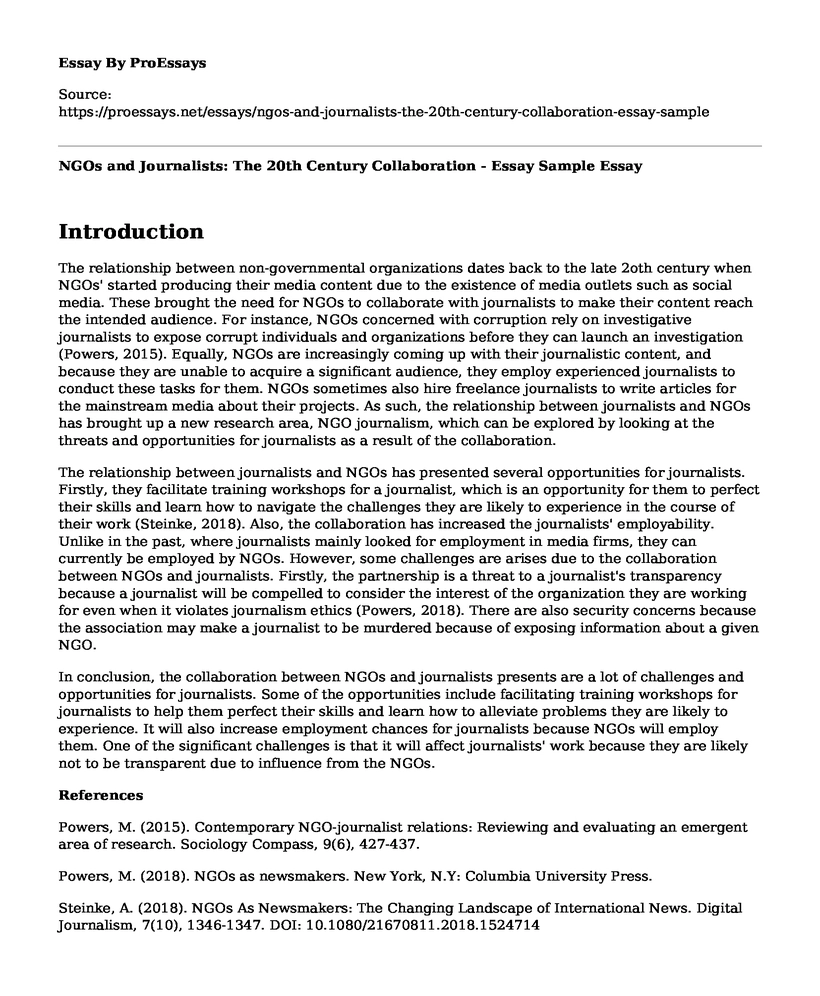Introduction
The relationship between non-governmental organizations dates back to the late 2oth century when NGOs' started producing their media content due to the existence of media outlets such as social media. These brought the need for NGOs to collaborate with journalists to make their content reach the intended audience. For instance, NGOs concerned with corruption rely on investigative journalists to expose corrupt individuals and organizations before they can launch an investigation (Powers, 2015). Equally, NGOs are increasingly coming up with their journalistic content, and because they are unable to acquire a significant audience, they employ experienced journalists to conduct these tasks for them. NGOs sometimes also hire freelance journalists to write articles for the mainstream media about their projects. As such, the relationship between journalists and NGOs has brought up a new research area, NGO journalism, which can be explored by looking at the threats and opportunities for journalists as a result of the collaboration.
The relationship between journalists and NGOs has presented several opportunities for journalists. Firstly, they facilitate training workshops for a journalist, which is an opportunity for them to perfect their skills and learn how to navigate the challenges they are likely to experience in the course of their work (Steinke, 2018). Also, the collaboration has increased the journalists' employability. Unlike in the past, where journalists mainly looked for employment in media firms, they can currently be employed by NGOs. However, some challenges are arises due to the collaboration between NGOs and journalists. Firstly, the partnership is a threat to a journalist's transparency because a journalist will be compelled to consider the interest of the organization they are working for even when it violates journalism ethics (Powers, 2018). There are also security concerns because the association may make a journalist to be murdered because of exposing information about a given NGO.
In conclusion, the collaboration between NGOs and journalists presents are a lot of challenges and opportunities for journalists. Some of the opportunities include facilitating training workshops for journalists to help them perfect their skills and learn how to alleviate problems they are likely to experience. It will also increase employment chances for journalists because NGOs will employ them. One of the significant challenges is that it will affect journalists' work because they are likely not to be transparent due to influence from the NGOs.
References
Powers, M. (2015). Contemporary NGO-journalist relations: Reviewing and evaluating an emergent area of research. Sociology Compass, 9(6), 427-437.
Powers, M. (2018). NGOs as newsmakers. New York, N.Y: Columbia University Press.
Steinke, A. (2018). NGOs As Newsmakers: The Changing Landscape of International News. Digital Journalism, 7(10), 1346-1347. DOI: 10.1080/21670811.2018.1524714
Cite this page
NGOs and Journalists: The 20th Century Collaboration - Essay Sample. (2023, Apr 25). Retrieved from https://proessays.net/essays/ngos-and-journalists-the-20th-century-collaboration-essay-sample
If you are the original author of this essay and no longer wish to have it published on the ProEssays website, please click below to request its removal:
- Marketing Communication Tools
- Always Like a Girl Campaign
- Advertising and PR Paper Example on Panasonic
- Political Frame and Organizations - Essay Sample
- Achieving Optimal Security: Using ISO-IEC 27040 in Industries - Essay Sample
- Paper Example on Agile Management: Impacts on Organizational Performance & Public Value
- Essay Sample on Privacy Policy: Understanding How Your Data is Protected







